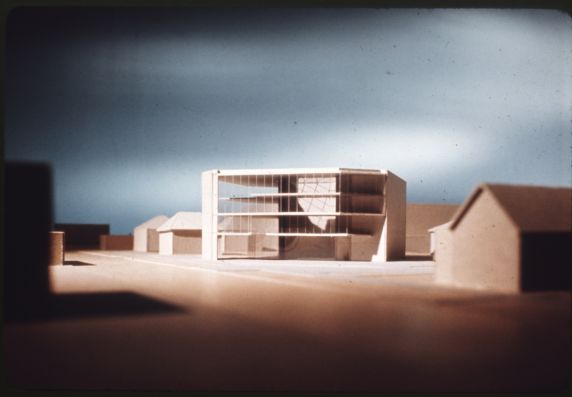The Origins of the Reuther Library building
This blog post is part of a series celebrating the 50th Anniversary of the Reuther Library's building.
The Walter P. Reuther Library at Wayne State University represents a landmark in the preservation and accessibility of labor history in North America. In the formative years of the then-named Labor History Archives, the United Auto Workers (UAW) provided two $10,000 grants and pledged “unlimited support,” enabling the fledgling University and Labor Archives to flourish far beyond initial expectations. Within just six years, the collection had outgrown its original storage capacity—space that was projected to last for two decades. Recognizing the need for long-term infrastructure, Archives founder Dr. Philip Mason proposed the idea of a dedicated building to university officials and rallied many influential Labor and University leaders to his campaign.
At that time, only two institutions in North America housed labor libraries: the Labor and Industrial Relations Building at the University of Illinois and the James M. Carey Memorial Building at Rutgers University. Both were significantly funded by union contributions and served as precedent for Dr. Mason’s ambitions. Early on UAW Education Secretary Carroll Hutton became a key advocate for the project, persuading influential UAW figures such as Vice President Leonard Woodcock and Walter Reuther himself to support the idea. Hutton also personally escorted Mason to Rutgers to study the development process there.
The decision on where to construct the archive building was driven by a need for academic integration and accessibility. While it was ultimately determined that the facility should be located adjacent to Wayne State's Main Library to ensure convenient access to existing library resources for researchers, alternative sites considered included two different narrow strips of land near the Ford Freeway. The architectural firm of O’Dell, Hewlett, and Luckenbach, based in Birmingham, Michigan, was selected to design the facility along with the firm of Sasaki, Dawson, & DeMay Associates to serve as the site planners. One major point of the developing plans was to include a factor of expansion to allow the Archives to grow to at least twice its then-current size.
Funding for the new building reflected both institutional and labor union support. The cost of the building was slated to be $1.5 million and with a Wayne State University commitment of $100,000, the rest of the cost fell on the labor movement. The UAW announced their major contribution of $1.2 million toward the project at their Twentieth Annual Constitutional Convention in Long Beach, California, on May 20, 1966. Following this, there was a push to fundraise from various Labor sources. However, as time went on, Dr. Mason noted that it would be “exceedingly unlikely” to get funding from other unions and suggested searching for the remaining $300,000 from one or more individuals.
During all of this planning for the building, the Archives also underwent a name change. Starting out as the “Labor History Archives,” in 1969 the name was changed to “The Archives of Labor History and Urban Affairs” to more aptly represent its identity. Dr. Mason campaigned the UAW and the University for this name change, feeling the first name was too restrictive and off-putting to potential Urban donors and researchers. He wanted to ensure the collections of social, political, and economic reform movements were represented in the name. Ultimately, to honor UAW President Walter P. Reuther’s 30 years of service, the building was named in his memory and still stands as the “Walter P. Reuther Library, Archive of Labor and Urban Affairs.”
The building of the Reuther spanned the leadership of multiple university presidents, from William Hillberry to William Keast, and was propelled forward by the unwavering efforts of many Labor and Wayne State University advocates including Carroll Hutton, Leonard Woodcock, Irving Bluestone, Emil Mazey, Dr. Mason, and Dean of Libraries Arthur Neef amongst many others. Their collaboration not only established the Reuther Library as a cornerstone of labor scholarship but also underscored the power of partnerships between academia and the labor movement.
Molly Banes is an Audiovisual Archivist at the Reuther Library, specializing in Audio and Moving Image collections.


 Reddit
Reddit Facebook
Facebook LinkedIn
LinkedIn